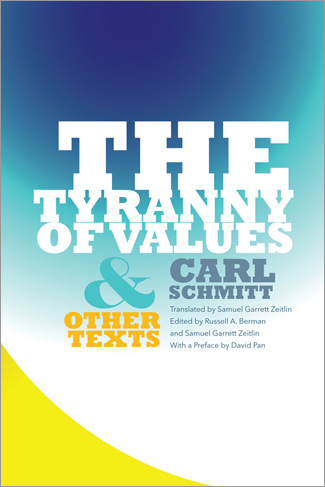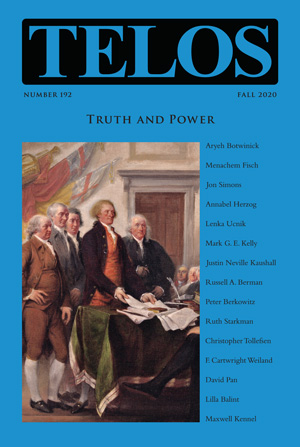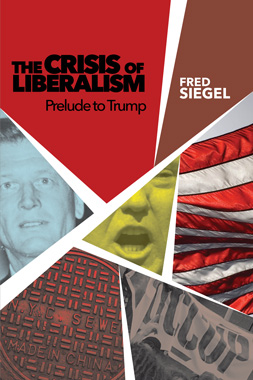By Telos Press · Friday, June 4, 2021 In today’s episode of the Telos Press Podcast, Camelia Raghinaru talks with Michael Millerman about his article “The Ethnosociological and Existential Dimensions of Alexander Dugin’s Populism,” from Telos 193 (Winter 2020). An excerpt of the article appears here. To learn how your university can subscribe to Telos, visit our library recommendation page. Print copies of Telos 193 are available for purchase in our store.
Listen to the podcast here.
Continue reading →
By Telos Press · Monday, February 22, 2021 In the Spring issue of American Affairs, Blake Smith writes at length about Carl Schmitt’s “The Tyranny of Values,” the title essay of the collection The Tyranny of Values and Other Texts, published by Telos Press. Edited by Russell A. Berman and Samuel Garrett Zeitlin, translated by Samuel Garrett Zeitlin, and with a preface by David Pan, Schmitt’s The Tyranny of Values and Other Texts is now available for purchase in our online store. Save 20% off the list price by using the coupon code BOOKS20 during the checkout process.
An excerpt from the review:
 To those familiar with his most famous writings, it may seem that Carl Schmitt is an enemy of liberalism. In texts such as The Concept of the Political (1932) and Legality and Legitimacy (1932), Schmitt critiqued the Weimar Republic and the liberal tradition, the weaknesses of which Weimar seemed to embody. Liberalism, Schmitt argued, depends on systematic neutralizations—fictions by which all individuals and points of view are imagined to be equal, and by which the confrontations of political life seem to be transformed into peaceful, rule-governed debates with open-ended, undetermined outcomes. His writings during the Nazi era endorsed a new understanding of politics in which such deceptive procedures are replaced by the decisions of a charismatic leader who acts on behalf of a homogeneous people against its internal and external foes. Radicals of the Right and Left have found inspiration in Schmitt’s analysis of liberalism and calls for moving beyond it to a realistic and engaged theory that recognizes the insuperable conflicts at the heart of politics. To those familiar with his most famous writings, it may seem that Carl Schmitt is an enemy of liberalism. In texts such as The Concept of the Political (1932) and Legality and Legitimacy (1932), Schmitt critiqued the Weimar Republic and the liberal tradition, the weaknesses of which Weimar seemed to embody. Liberalism, Schmitt argued, depends on systematic neutralizations—fictions by which all individuals and points of view are imagined to be equal, and by which the confrontations of political life seem to be transformed into peaceful, rule-governed debates with open-ended, undetermined outcomes. His writings during the Nazi era endorsed a new understanding of politics in which such deceptive procedures are replaced by the decisions of a charismatic leader who acts on behalf of a homogeneous people against its internal and external foes. Radicals of the Right and Left have found inspiration in Schmitt’s analysis of liberalism and calls for moving beyond it to a realistic and engaged theory that recognizes the insuperable conflicts at the heart of politics.
Continue reading →
By Telos Press · Thursday, November 19, 2020 In today’s episode of the Telos Press Podcast, Camelia Raghinaru talks with John Milbank about his article “In Triplicate: Britain after Brexit; the World after Coronavirus; Retrospect and Prospect,” from Telos 191 (Summer 2020). An excerpt of the article appears here. If your university has an online subscription to Telos, you can read the full article at the Telos Online website. For non-subscribers, learn how your university can begin a subscription to Telos at our library recommendation page. Purchase a print copy of Telos 191 in our online store.
Listen to the podcast here.
Continue reading →
By Tony Stigliano · Thursday, October 29, 2020 Isaac Lopez has argued in a commentary published recently on this site that Trump has a good chance of winning this November because the liberals have replaced “American values” with laws and norms that are foreign and enraging. In response, the “silent majority” (in fact, a minority) of Americans elected “a very stable genius.” This essay is about the nature of an aspect of Donald J. Trump’s governance that has been overlooked: his cult. None of the usual political arguments can explain the desperate stances taken by his followers. The explanation offered here is twofold: One is the need for reversing a feared path to secular “socialism.” The second is that Trump has asserted that reality is subject to his will and personality. Ancillary to this is the idea that Trump’s persona can unify America by subordinating “difference” to a mythic national identity.
Donald Trump has, for a large minority (possibly 40 percent of the electorate), the persona of a mythic Hero. A Hero who can overcome all obstacles by sheer will. Through a close reading of Trump’s angry language, one realizes that Trump has woven a recognizable myth for citizens bereft of purpose and power. This is Trump’s will-to-power. Trump has given meaning and purpose to people losing out to technology, urban wealth, science’s truth, and social helplessness exacerbated by the pandemic. He is a hero of revenge against regulators, the media, and modernity itself. Even the pandemic cannot overcome him; he overcomes the pandemic, until recently.
Continue reading →
By Mark G. E. Kelly · Tuesday, October 20, 2020 Mark G. E. Kelly’s “Is Fascism the Main Danger Today? Trump and Techno-Neoliberalism” appears in Telos 192 (Fall 2020): Truth and Power. Read the full article at the Telos Online website, or purchase a print copy of the issue in our online store. Individual subscriptions to Telos are available in both print and online formats.
 In this article, I argue against the prevalent tendency, both in popular and scholarly discourse, to understand the Trump presidency as representing an incipient American fascism. I point out that Trump’s actual administration has shown no features distinctive of fascism, and that all alleged fascist policies of Trump are deeply in continuity with the pattern of liberal U.S. politics. I further argue that the most extraordinary aspect of Trump’s presidency, his strident rhetoric, while representing a deviation from U.S. politics as usual, is nonetheless not distinctively fascist. Lastly, I point out that, while Trump’s rhetoric and policies have drawn him support from literal fascists, he has little real connection with them and has largely disappointed rather than encouraged them. Instead, I suggest that Trump’s presidency represents the opposite of robust use of state power we associate with fascism, namely, a further decline in federal executive power in favor of the power of corporations. I conclude by suggesting that the increase of the censorious power of Big Tech in particular represents a far greater threat to democracy than Trump, and that the left’s monomaniacal focus on opposing Trump has allowed this tendency to go unchecked. In this article, I argue against the prevalent tendency, both in popular and scholarly discourse, to understand the Trump presidency as representing an incipient American fascism. I point out that Trump’s actual administration has shown no features distinctive of fascism, and that all alleged fascist policies of Trump are deeply in continuity with the pattern of liberal U.S. politics. I further argue that the most extraordinary aspect of Trump’s presidency, his strident rhetoric, while representing a deviation from U.S. politics as usual, is nonetheless not distinctively fascist. Lastly, I point out that, while Trump’s rhetoric and policies have drawn him support from literal fascists, he has little real connection with them and has largely disappointed rather than encouraged them. Instead, I suggest that Trump’s presidency represents the opposite of robust use of state power we associate with fascism, namely, a further decline in federal executive power in favor of the power of corporations. I conclude by suggesting that the increase of the censorious power of Big Tech in particular represents a far greater threat to democracy than Trump, and that the left’s monomaniacal focus on opposing Trump has allowed this tendency to go unchecked.
Continue reading →
By Telos Press · Monday, October 19, 2020 Writing at the Wall Street Journal, Tunku Varadarajan profiles Fred Siegel, author of The Crisis of Liberalism: Prelude to Trump, now available from Telos Press Publishing. Order your copy in our online store and save 20% by using the coupon code BOOKS20 during checkout. Also available in Kindle ebook format from Amazon.com.
An excerpt:
 . . . Mr. Siegel traces the origins of the “present-day contempt” for the middle class back a century. He cites H.L. Mencken’s demeaning of the bourgeoisie, in the celebrated editor’s coinage of “booboisie.” Mr. Siegel has written extensively on Herbert Croly, the political philosopher and co-founder of the New Republic, as well as on the novelists H.G. Wells and Sinclair Lewis (who, in 1930, became the first American to win the Nobel Prize for Literature). These three men, Mr. Siegel says, laid the foundation for an elite revolt against the American middle class that endures to this day. . . . Mr. Siegel traces the origins of the “present-day contempt” for the middle class back a century. He cites H.L. Mencken’s demeaning of the bourgeoisie, in the celebrated editor’s coinage of “booboisie.” Mr. Siegel has written extensively on Herbert Croly, the political philosopher and co-founder of the New Republic, as well as on the novelists H.G. Wells and Sinclair Lewis (who, in 1930, became the first American to win the Nobel Prize for Literature). These three men, Mr. Siegel says, laid the foundation for an elite revolt against the American middle class that endures to this day.
“Croly’s idea was that the college-educated, the elite, should become a new aristocracy,” Mr. Siegel says. “Croly believed that the middle-class and their allies—latter-day Jeffersonians who advocated individual freedom and acted in their own self-interest—were impeding the path of the experts, who were ‘disinterested.'”
Wells and Lewis bolstered the view that the professional class was above the fray, giving the argument an almost aesthetic hue. “They thought the middle class was vulgar,” Mr. Siegel says. Mr. Siegel cites a passage in Lewis’s novel “Main Street” (1920), which he regards as “a sardonic sally at the small-town American middle class and its commercial culture.” In the passage, Carol Kennicott, a young woman from the big city trapped by marriage in small-town America, describes Americans as “a savorless people, gulping tasteless food, and sitting afterward, coatless and thoughtless, in rocking chairs . . . and viewing themselves as the greatest race in the world.” In a word, deplorables.
Croly has been largely forgotten, Mr. Siegel says, because liberalism has been largely eclipsed. “Wokeism is not liberalism,” he says. “I don’t want to be unfair to liberals. I was very critical of liberals, but they were in favor of debate; they were in favor of empiricism, of open argument.” Wokeism, by contrast, is a “new secular revealed religion,” which involves no “investigation or empirical study.”
Continue reading →
|
|










